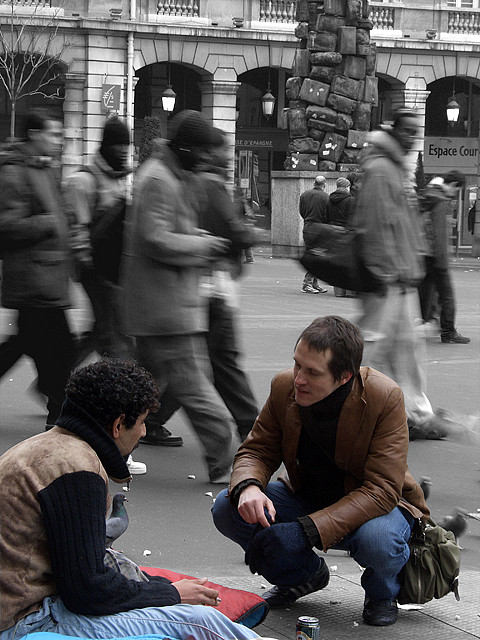On the way, he sent this message to King Jehoshaphat of Judah:
“The king of Moab has rebelled against me. Will you help me fight him?”
And Jehoshaphat replied, “Why, of course!
You and I are brothers, and my troops are yours to command. Even my horses are at your service.”
2 Kings 3:7 nlt
___
The envelope was blank except for the words “Love Wastefully” written across the front in simple black handwriting.
It was the sole item in our mailbox that day, which was already odd considering the normal flood of junk mail and bills. I remember my hands shaking a little bit as I held it. I read the words over and over, at least 15 times. “Love Wastefully.” I remember being conflicted over the odd combination; was this a friendly message or an angry accusation? Finally, my curiosity overtook me, and I turned the envelope over and slid my finger under the seal to open it. Inside was a generous amount of cash and nothing else. No note, no instructions, no one to thank – just money. My heart literally skipped a beat as I fumbled to wrap my brain around the experience. My husband and I celebrated this amazing miracle for many weeks following that moment, exploring what Loving Wastefully could mean in our lives. This week, my reading led me to discover some of how God defines the choice to love wastefully.
In 2 Kings chapter 3, Ahab and Jezebel’s son Joram (who was slightly less evil than his parents) was ruling Israel. One of the provinces under his control (Moab) decided to rebel and stopped paying tribute to the King. This angered King Joram and he decided to wage war on Moab as punishment. On his way into battle, he sent a message to King Jehoshaphat, ruler of Judah, to ask for help. Jehoshaphat’s response blew me away:
And Jehoshaphat replied, “Why, of course! You and I are brothers, and my troops are yours to command. Even my horses are at your service.” (2 Kings 3:7b)
King Jehoshaphat was a Godly man; one who sought the Lord and ruled within God’s commands. Why would someone like that be so generous to an evil son of an evil man? Then, I immediately remembered that Jehoshaphat’s kindness extended even earlier that. In 1 Kings 22, he had extended an almost identical offer to Ahab himself!
Then he turned to Jehoshaphat and asked, “Will you join me in fighting against Ramoth-gilead?” And Jehoshaphat replied to King Ahab, “Why, of course! You and I are brothers, and my troops are yours to command. Even my horses are at your service.” (1 Kings 22:4)
In both cases, I remember thinking that Jehoshaphat was making kind of a moron move. I couldn’t understand why he would willingly give his own time, energy and resources to two different wayward leaders. If I were living at that time, and allowed to speak to Jehoshaphat frankly, I would tell him he was being foolish. But I’m wrong; he wasn’t foolish at all. He was loving wastefully – and here is where I became clear on that. In BOTH cases of generosity (to Ahab and to Joram) Jehoshaphat didn’t allow the battle to begin until they together consulted The LORD. No false prophets were allowed to substitute-advise. He insisted upon a “prophet of the LORD.”
With Ahab: But Jehoshaphat asked, “Isn’t there a prophet of the LORD around, too? I would like to ask him the same question.”
King Ahab replied, “There is still one prophet of the LORD, but I hate him. He never prophesies anything but bad news for me! His name is Micaiah son of Imlah.”
“You shouldn’t talk like that,” Jehoshaphat said. “Let’s hear what he has to say.”With Joram:But King Jehoshaphat of Judah asked, “Is there no prophet of the LORD with us? If there is, we can ask the LORD what to do.” One of King Joram’s officers replied, “Elisha son of Shaphat is here. He used to be Elijah’s personal assistant.”
Jehoshaphat said, “Then the LORD will speak through him.” So the kings of Israel, Judah, and Edom when to consult with Elisha. (2 Kings 3:11-12)
Jehoshaphat extended love wastefully with wisdom. He offered himself as a friend and brother to positively influence ANYONE in his life. When called upon for help, he gives generously beyond what he is asked. And finally, he not only personally consulted God but also insisted that anyone he was doing business with did so also.
I can’t help but think of another leader that loved wastefully in this same way. I don’t deserve it, but Jesus calls me a friend and sister. When I call on him for help, he overwhelms me with more than I could ever ask for, including his own perfect life and death. And, like Jehoshaphat, he encourages me to bring my plans to the LORD.
Because I want to honor God with my life, I will follow this example as best as I can. I will love NOT frugally, NOT in timidity, but rather as though it were my last day alive: extravagantly, without worrying if I will have enough for tomorrow, WASTEFULLY.
Challenge: Each day, find someone to Love Wastefully as Jehoshaphat did by 1) offering friendship, 2) giving generously, and 3) courageously, contagiously consulting God.
___
Dear Lord, Thank you for loving me even though I don’t deserve it. Please give me the strength, courage and wisdom to extend love extravagantly and wastefully to everyone my life touches. Let these acts of wasteful love transform me more every day into the person created me to be. Amen.








0 Comments